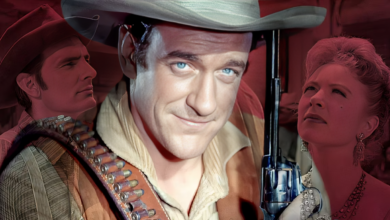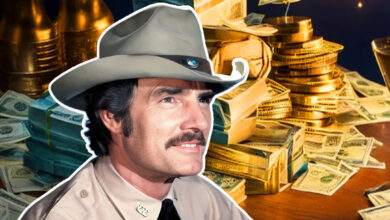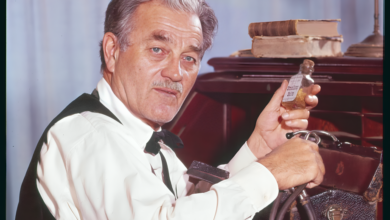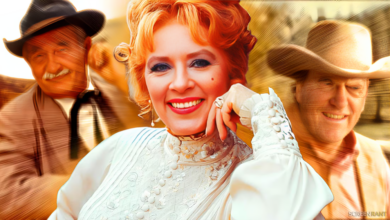Dennis Weaver DIED TRAGICALLY And UNEXPECTEDLY After Revealing His SECRET


Lifestory of Dennis Weaver. The world saw him as a Western icon, a symbol of rugged justice. But Dennis Weaver, the man behind ‘McCloud’ and ‘Gunsmoke,’ led a life more winding than any dusty trail. Fame, fortune, hidden pain – his story was a drama that unfolded like a stage play, culminating in a final, heartbreaking secret. Join us as we explore the life of Dennis Weaver and the truth he kept hidden until the very end..
Early Life: Shaped by Hardship
Born into the heart of the Great Depression on June 4, 1924, in Joplin, Missouri, William Dennis Weaver’s early years were marked by significant hardship. His parents, Walter Leon Weaver, of mixed English, Irish, and Osage ancestry, and Lena Leora Prather, instilled in him the values of hard work, resilience, and determination. These values would later define his approach to both his acting career and his commitment to social and environmental causes.
The Weaver family was constantly on the move, from Shreveport, Louisiana, to Mankato, California, and various places in between. These early travels exposed young Dennis to different worlds and laid the foundation for his future acting career. However, it was his upbringing on a farm that truly molded his character. Dennis learned firsthand the importance of hard work and perseverance in the face of adversity.
During the Great Depression, the Weaver family’s struggles were not uncommon, but they were nonetheless difficult. As sharecroppers, they often journeyed west in search of food to share with fellow farmers. This experience developed Dennis’s deep connection to the land and a profound understanding of the human condition. Despite their hardships, the Weaver family remained close-knit and supportive. Walter Leon worked tirelessly to provide for his family, taking on various jobs to make ends meet, while Lena Leora was the glue that held the family together, offering love and encouragement to her children even in the darkest times.

Athletic Pursuits and Military Service
As Dennis Weaver grew older, his passion for athletics became evident. His natural talent on the basketball court earned him a coveted scholarship to Missouri Southern State University. This opportunity allowed him to pursue higher education despite the economic difficulties of the time. However, his time at Missouri Southern State University was brief. He soon transferred to the University of Oklahoma to study dramatics, a decision that would set him on the path to becoming one of America’s most beloved actors.
Before he took the stage, Dennis made a name for himself in track and field at the University of Oklahoma, setting records and excelling in several events. His lightning-quick speed and unwavering determination made him a formidable force. He was also a talented basketball player, having honed his skills on the courts of Joplin High School. His exceptional performance on the court earned him a scholarship to college, a testament to his dedication and hard work.
Dennis’s Olympic dreams were cut short when he failed to qualify for the 1948 United States Olympic team, finishing sixth in the decathlon category. This heartbreaking defeat ultimately led him to pursue his true calling: acting. Despite the setback, his time as a student-athlete taught him valuable lessons about discipline and perseverance.
With a strong sense of duty to his country, Dennis enlisted in the United States Navy without hesitation. He served as a pilot of the Vought F4U Corsair fighter aircraft, a formidable machine capable of reaching speeds of up to 446 mph and armed with 650 caliber M2 Browning machine guns. Piloting such an aircraft was no easy feat, but Dennis rose to the challenge with determination and grit. His military service exposed him to the horrors of war, fostering a deep empathy for those who had suffered the ravages of conflict.

The Path to Stardom
Dennis Weaver’s acting career began with humble beginnings. After deciding to stay in New York and pursue acting full-time, he knew he would have to work hard to make a name for himself. He attended the prestigious Actors Studio, studying under respected teachers and meeting influential figures like Shelley Winters. To support himself, Dennis took on various odd jobs, from selling vacuum cleaners door-to-door to working as a delivery driver for a florist.
In 1953, Dennis landed a role in the Technicolor Western “The Redhead from Wyoming.” Though it was a small part, it marked his first big-screen appearance and a step in the right direction. His career breakthrough came when he was cast as Chester Goode in the television Western drama series “Gunsmoke.” This role would make him a household name and launch his career to new heights.
Dennis brought a unique depth to Chester’s character, making him feel like a real person rather than just a fictional creation. One of Chester’s memorable traits was his distinctive limp, a characteristic Dennis decided on to add depth to the role. His performance earned critical acclaim and a loyal following, culminating in an Emmy Award for Best Supporting Actor in 1959. For Dennis, the real reward was the opportunity to bring joy and entertainment to millions of viewers each week.
Diversifying His Talents
Despite the success of “Gunsmoke,” Dennis Weaver knew he had more to offer as an actor. Leaving the beloved role of Chester was a gamble, but he was determined to prove his range and tackle more complex and nuanced roles. In 1966, he appeared in the Western “Duel at Diablo,” playing a grizzled cavalry scout haunted by his past. This role showcased his ability to bring depth and nuance to complex characters.
Dennis also appeared in episodes of classic shows like “The Silent Service,” “Alfred Hitchcock Presents,” and “The Twilight Zone,” always bringing his unique blend of intensity and vulnerability to every performance. In 1970, he landed the role of Sam McCloud in the police drama “McCloud,” earning two Emmy Award nominations for his portrayal of the tough-as-nails lawman from New Mexico.

A Passion for Music and Directing
In the 1970s, Dennis Weaver explored his love of music and his passion for storytelling behind the camera. In 1972, he released his first album under Impress Records LP, a collection of country-tinged ballads and folk songs. The album was well received by critics and fans alike, establishing Dennis as a serious musician with a unique perspective.
Dennis’s interest in directing also grew during this time. He directed four episodes of “Gunsmoke,” bringing a fresh perspective and keen eye for detail to the show. His work behind the camera earned praise from colleagues and fans alike. He went on to direct an episode of “McCloud,” further showcasing his versatility and creative vision.
Environmental Advocacy and Humanitarian Efforts
Beyond acting, Dennis Weaver was deeply committed to environmental and humanitarian causes. In the early 1980s, he co-founded the nonprofit organization Love Is Feeding Everyone (LIFE), which worked to combat hunger and poverty in the Los Angeles area. The organization provided food and support to thousands in need and remains active to this day.
Dennis was also an advocate for environmental sustainability. He built an eco-friendly home, dubbed the “Earthship,” in Ridgeway, Colorado. The house was a marvel of sustainable design, constructed almost entirely from recycled materials and powered by renewable energy sources. The Earthship featured walls made from used tires packed with earth, solar panels for electricity, and a rainwater collection system. It was a model of sustainable living and inspired countless others to adopt eco-friendly practices.
Personal Life and Legacy
Dennis Weaver’s personal life was as rich and varied as his acting career. After serving in World War II, he married Gerry Stowell, with whom he shared a loving and enduring relationship. Together, they raised three sons, and Dennis was a devoted husband and father who cherished family time.
In 1958, Dennis made a significant personal decision that impacted his life profoundly: he became a vegetarian. This lifestyle change reflected his commitment to health and ethical living, which he maintained throughout his life.
As Dennis Weaver entered the twilight of his life, he harbored a painful secret that he kept hidden from even his closest loved ones. Unbeknownst to his wife Gerry and his three sons, Dennis was battling prostate cancer. For years, he endured the agony of his illness in silence, never letting anyone know the true extent of his suffering. It was only one day before his passing that he revealed the truth to Gerry.
Dennis Weaver passed away at his home in Ridgeway, Colorado, on February 24, 2006, at the age of 81, surrounded by his loving family. The news of his passing sent shockwaves through the entertainment industry and beyond. Fans and colleagues mourned the loss of a true icon who had left an indelible mark on the world through his art, advocacy, and boundless creativity.
Conclusion
Dennis Weaver’s life was a rich tapestry of experiences, from his humble beginnings during the Great Depression to his rise as a beloved television icon, his dedication to environmental and humanitarian causes, and his final, poignant battle with cancer. His legacy lives on not only through his memorable performances but also through his tireless advocacy and commitment to making the world a better place. Dennis Weaver’s story is a testament to the power of resilience, determination, and the enduring impact of living a life dedicated to both art and service.





